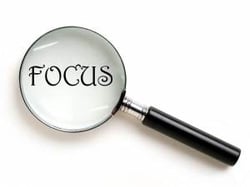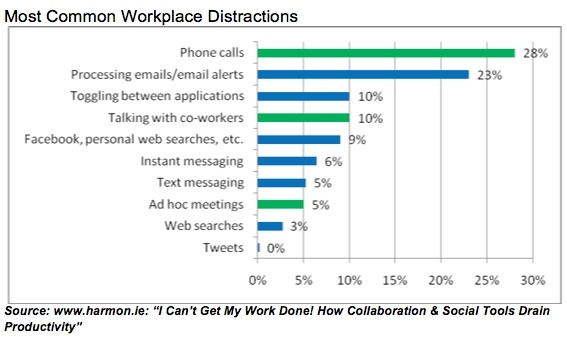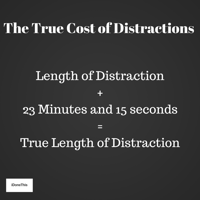On Wednesday last week, I delivered a Toastmasters speech including the following admonishment: Your past shortfalls can be traced, at their root, to one major oversight: you haven’t committed yourself to living by the truth that your thoughts have consequences so great that they create your reality.
 While there’s no greater truth than this, I believe this statement is frequently a result of one other shortfall: A Lack of Focus.
While there’s no greater truth than this, I believe this statement is frequently a result of one other shortfall: A Lack of Focus.
If I go back and review my success and failures I can attribute all to the two in combination with each other.
If thoughts beget things or as the statement above discloses, “creates our reality” then the lack of focusing on what you want your thoughts to produce is why you fail to live this truth.
DISTRACTIONS COST

Here are some of the simple truths about being distracted and what it costs us:
- The average person now checks their mobile phone 150 times every day (just short of every 6 waking minutes).
- A 2007 study by Basex estimated that distractions cost U.S. businesses $588 billion per year.
- The average employee spends 28% of their time dealing with unnecessary interruptions followed by "recovery time" to get back on track. (2009, Basex)
- The time spent per day being interrupted and trying to refocus is 2.1 hours. (2009, Basex)
- Physically co-located workers spend longer chunks of time engaged in tasks for which they are not accountable. (University of California-Irvine)
- The average manager is interrupted every 8 minutes. (Study conducted by Priority Management)
- Office workers are interrupted—or self-interrupt—roughly every three minutes, academic studies have found, with numerous distractions coming in both digital and human forms. reported by Rachel Emma Silverman atThe Wall Street Journal.
 Once thrown off track, it can take some 23 minutes for a worker to return to the original task, says Gloria Mark, a professor of informatics at the University of California, Irvine, who studies digital distraction.
Once thrown off track, it can take some 23 minutes for a worker to return to the original task, says Gloria Mark, a professor of informatics at the University of California, Irvine, who studies digital distraction. - Email problem: Atos, a global IT services company based outside of Paris, with 74,000 employees, discovered in an internal study workers spent some two hours a day managing their inboxes. The company vowed to phase out internal email entirely.
- Technology dominates the time that employees spend being distracted from work. In a recent CareerBuilder study half of all respondents admitted to using their cell phones to send personal calls and texts while on the clock. Thirty-eight percent said that they spent time on social media, while 23 percent sent personal emails.
If I asked you to make a list of your successes and failures, how many would be the result of lack of focus?
TAKE A Personal Inventory:
|
Successes |
Ability to Focus |
Failures |
|
Acute Myeloid Leukemia Remission |
|
2 Divorces |
|
Own Radio Station |
|
Own more than 1 radio station |
|
Successful Coaching Business |
|
|
|
Teach my three sons to be responsible and love themselves |
|
|
Take this personal challenge and list your successes and failures. Wouldn;t you agree that your lack of focus, failing to make what you truly wanted, is the result of not making your ONE THING the most important focus of your life? We dedicated a whole series of blogs to The ONE Thing: The Surprisingly Simple Truth Behind Extraordinary Results by Gary Keller, Jay Papasan and spent an entire blog (Until My ONE Thing Is Done—Everything Else Is A Distraction!) to this idea.
How frequently do you ask yourself: What’s the ONE Thing I can do such that by doing it everything else will be easier or unnecessary?
IF you agree your past shortfalls are traced to not recognizing how your thoughts have consequences so great they create your reality, what are you doing today to prevent your present thoughts from destroying or constructing your future reality?
What’s your One Thing?
Can you answer this question without hesitation?
Frankly if you have to think about it, it’s not a one thing. A one thing should be so self-absorbing, so consuming, so compelling, it literally propels you out of bed in the morning! Imagine something so fascinating it launches your day like booster rockets on the space shuttle!
What do you do each morning to assure you start out each day ready and excited to attack your One Thing?
What actions do you perform each day to have the proper attitude to help you achieve your ONE THING?
Brian Tracy admonishes us, “Negative emotions have to be continually worked or they die of their own volition.”
The fastest way to get over our guilt and refuse to allow negative emotions to hold us back is by simply repeating to ourselves whenever we feel negativity, “I am responsible.”
Tracy recommends a simple idea for elevating our self-esteem and self-worth.
Where do our expectations come from?
Our expectations come from our belief about ourselves and reality. These form our self-concept.
Our self-concept is the single most important predictor of our performance and effectiveness in every area of our life. We always act in a manner consistent with our self-concept. We are in a one to one relationship between our level of human potential and our self-concept.
The most powerful affirmation you can use is: “I LIKE MYSELF!”
 It’s like putting a flame to the ball of a mercury thermometer – every time you say “I LIKE MYSELF!” your self-esteem raises commensurately.
It’s like putting a flame to the ball of a mercury thermometer – every time you say “I LIKE MYSELF!” your self-esteem raises commensurately.
Do you like yourself?
When was the last time you acknowledged that? Do you make it a practice to say affirmations, and do you allow yourself to admit that you like yourself?
It may seem like the ultimate arrogance to look yourself in the mirror and say, “I LIKE MYSELF.”
Yet think of doing the reverse and what it would do to you. How many of us denigrate ourselves constantly.
How many times do you say to yourself, “Dang that was stupid!” Why did I do that? Boy you really screwed that up! What an idiot.”
I’m not suggesting you become arrogant or conceited. In fact those people are the most insecure.
High Self-Esteem
The person who has high self-esteem, confidence, enthusiasm and genuinely likes himself rarely if ever gives off the appearance of arrogance. This person is so well centered that they easily focus on others. They make who they’re with the center of attention, asking questions, showering them with their interest by listening attentively, and in doing so earning their trust and respect.
Isn’t that the type of person you would trust to be your leader?
In summary: What’s the One Thing you can do to achieve your potential as a leader and a person?
Improve your ATTITUDE!
“It is our attitude at the beginning of a difficult task which, more than anything else, will affect its successful outcome.” -- William James, "Father of American psychology"






.jpeg?width=150&height=135&name=Hand%20with%20marker%20writing%20the%20question%20Whats%20Next_%20(1).jpeg)

